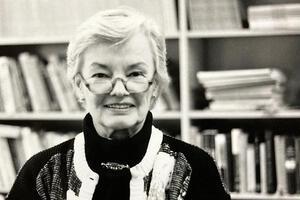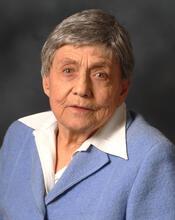Judith Jarvis Thomson
Judith Jarvis Thomson was a twentieth-century American philosopher who made major contributions to ethical discussions both within and beyond the walls of the university. In her four-decade career, Thomson published important papers in ethics, metaphysics, and the philosophy of law, including the widely anthologized essays “A Defense of Abortion” (1971) and “The Trolley Problem” (1985), both of which apply the techniques of analytic philosophy to questions of morality. Thomson spent the bulk of her philosophical career as a professor at the Massachusetts Institute of Technology, where she taught for nearly four decades, from 1964 to 2004.
Family and Education
Born in New York City, on October 4, 1929, Judith (Jarvis) Thomson was the second child of Theodore Jarvis (Javitz), an accountant, and Helen (Vostrey) Jarvis, an English teacher. Her mother was of Catholic Czech extraction, and her father was descended from a line of Eastern European rabbis, including Rabbi Hayyim Eliezer Wachs of Kalish and Rabbi Jacob Emden. Raised in an observant family on the Lower East Side, Theodore Javitz changed his name to Jarvis in 1918. His relationship with his wife, which began at socialist summer camp, was a source of tension for both their families.
Helen Jarvis died when Judith was six, and Theodore Jarvis remarried two years later. His second wife was Jewish and had two children. She was a successful interior designer and an arts and antique dealer and importer.
Thomson’s parents placed no religious pressure on her, but she officially converted to Judaism at age fourteen, when she was confirmed at Temple Israel in Manhattan. Though her adult involvement with organized religion has been minimal, she described herself publicly as “feel[ing] concern for Israel and for the future of the Jewish people.”
Thomson attended elementary school in New York City and in Yonkers, graduating from Hunter High School in January 1946. She went on to receive a BA from Barnard College in 1950, a second BA from Cambridge University in 1952, an MA from Cambridge in 1956, and a PhD from Columbia in 1959, all in philosophy.
Career
In 1962, Judith Jarvis began teaching at Barnard College; soon afterward, she met and married the British philosopher James Thomson, who was a visiting professor at Columbia University. After spending 1962–1963 at Oxford, the couple moved to Boston, where James Thomson was appointed professor of philosophy at MIT. Judith Thomson taught for a year at Boston University and, in 1964, was appointed to the faculty at MIT, where she served as Laurence S. Rockefeller Professor of Philosophy until her retirement in 2004. The Thomsons were separated in 1976 and divorced in 1980; they remained colleagues until James Thomson’s death in 1984.
Judith Thomson served as visiting professor at the University of Pittsburgh (1976), the University of California at Berkeley Law School (1983), and Yale Law School (1982, 1984, 1985), and held fellowships from the Fulbright Foundation (1950–1951), the American Association of University Women (1962–1963), the National Endowment for the Humanities (1978–1979, 1986–1987), the Guggenheim Foundation (1986–1987), and the Center for Advanced Study in Oslo, Norway (1996). In 1989, she was elected to the American Academy of Arts and Sciences, and in 1992–1993 she served as president of the American Philosophical Association, Eastern Division. In 1999, she was honored with an invitation to deliver the Tanner Lectures on Human Values at Princeton University, published as Goodness and Advice in 2001, and in 2003, she delivered the American Philosophical Association’s Carus Lectures, published as Normativity in 2015.
Thomson’s honors continued after her retirement. In 2012, she was awarded the Quinn Prize by the American Philosophical Association in recognition of her service to the profession; that same year, she was invited to deliver the Dewey Lecture, which was published under the title ‘How it Was.” In 2015, she was awarded an honorary doctorate by the University of Cambridge, followed in 2016 by an honorary doctorate by Harvard University. In 2016, she was elected a Corresponding Fellow of the British Academy. In 2018, she was invited to deliver the inaugural Ruth Barcan Marcus Memorial Lecture at Yale University.
Thomson’s “trolley problem” dilemma—which elicits intuitions about the conditions under which it is morally permissible to sacrifice the life of one human being to save the life of another—has been widely discussed in philosophical journals, in experimental work in moral psychology, in industrial contexts (in the design of autonomous vehicles), and in popular culture. When she died on November 20, 2020, at the age of 91, her death was memorialized in the New York Times with a subheader that noted: “She wrote some of the most influential papers in contemporary American philosophy and prompted debates about urgent moral concerns in everyday life.”
A selection of her philosophical articles was collected into her well-respected 1986 anthology Rights, Restitution, and Risk. In addition, Thomson was the author of Acts and Other Events, The Realm of Rights, Moral Relativism and Moral Objectivity (with Gilbert Harman), and Goodness and Advice.
Selected Works by Judith Thomson
Acts and Other Events. New York: Cornell University Press, 1977.
Rights, Restitution, and Risk. Cambridge: Harvard University Press, 1986.
The Realm of Rights. Cambridge: Harvard University Press, 1990.
Symposium on The Realm of Rights. Philosophy and Phenomenological Research 53, no. 1 (March 1993): 159–194.
Moral Relativism and Moral Objectivity, with Gilbert Harman. Cambridge: Blackwell, 1996.
Symposium on Moral Relativism and Moral Objectivity. Philosophy and Phenomenological Research 58, no. 1 (March 1998): 171–222.
Goodness and Advice. Princeton, NJ: Princeton University Press, 2001.
Byrne, Alex. “Professor Emerita Judith Jarvis Thomson, highly influential philosopher, dies at 91.” MIT News, December 4, 2020. https://news.mit.edu/2020/professor-emerita-judith-jarvis-thomson-influential-philosopher-dies-1204
Traub, Alex. “Judith Jarvis Thomson, Philosopher Who Defended Abortion, Dies at 91.” New York Times, December 3, 2020. https://www.nytimes.com/2020/12/03/us/judith-jarvis-thomson-dead.html




